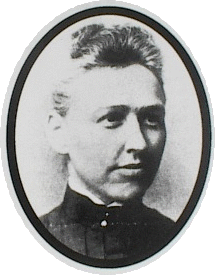KATHARINE BUSHNELL
(1855 – 1946)
“Hung as A Flag”
by Barbara Collins

Katharine Bushnell is a most influential women in exposing the way many scriptures have been stripped of their intended gender equality. When she searched the Hebrew and Greek, Katherine discovered bias concerning the subordination of women that male translators utilized in their interpretations, particularly in the translation of Paul’s writings. She greatly affected the proclamation of woman’s equality, not superiority or inferiority, in all her relationships whether regarding marriage or her place in God’s plan.
Katharine Bushnell’s legacy is found in her book, God’s Word to Women, which unmasks the translators’ motives from a theological perspective. Bushnell was a medical doctor, learned scholar of Biblical languages, and missionary to China. When God called her to China, she told Him she would go if He could prove Paul was not against women preaching. While in China, she felt she should go deeper in Bible study, particularly in areas dealing with male domination. She began to see that a prejudicial slant had indeed influenced those who translated scripture.
Bushnell left China in 1882 because one of her associates, Ella Gilchrist, was extremely ill. Returning to Denver, Katherine stayed with her until she died. Although she established a medical practice in Denver, her call to ministry took her to Chicago to become the National Evangelist of the Social Purity Department of the Women’s Christian Temperance Union and to work with prostitutes. Not only was Bushnell involved in rescue work for city missions, she also founded the Anchorage Mission in Chicago, ministering to around 5,000 women a year.
Bushnell discovered the source of the abuse of women came not only from alcohol but also from deliberate misinterpretation of the Bible by male translators. She then added the dimension of educating all women in Biblical languages so that the original intent of controversial passages could be clearly understood.
After hearing rumors about conditions in northern Wisconsin’s lumber camps that officials wouldn’t investigate, Bushnell decided to find the truth for herself. She discovered that young women and girls had been abducted and imprisoned in brothels. When she reported her findings to a WCTU meeting in Chicago, she was strongly castigated by newspapers and state officials. Katherine had stirred up the entire country on the “white slavery” issue. The sensationalism of the issue became a hindrance to her call of evangelism, and she sought the Lord for direction. Following a dream, she felt impressed of the Lord to go to England to assist Josephine Butler and the Social Purity Department in the WCTU there.
When it was learned the British army was operating brothels in India, a flurry of rumors and denials ensued. Bushnell and an associate planned to make India part of their world-wide evangelism tour. After interviewing 395 prostitutes, she sent her report to England, which promptly brought accusations and denials. However, the charges proved to be true. The Commander-in-Chief of British forces in India, Lord Roberts, was also responsible for the licensing and regulation of prostitution. These regulations were not for prevention of disease, but for protection of men visiting the brothels. Bushnell and her associate were fully vindicated of all accusations and received a written apology from Lord Roberts.
Bushnell found the same attitudes among British government officials, some of them professing Christians, in China and Hong Kong when they found forced prostitution. After her years on the mission field, Katherine began to realize “that woman’s plight was rooted in the fact that the Bible was seen to support the degradation and suppression of women. Her conclusion was that the Bible needed to be reinterpreted. . .”1 Her final battle, conducted on paper, God’s Word to Women, has basically been ignored by Bible scholars.
Dana Hardwick writes, “Bushnell stands for the freedom and equality of all women everywhere. She stands for the right and responsibility of women to take their position beside men and to be heard in every arena of life. She stands for the responsibility of women to educate themselves adequately to fulfill their responsibility and she looks with contempt on those who would shun that responsibility.”2 Women owe a debt of love and appreciation to Katharine Bushnell for the trailblazing sacrifice she made.
1 Hardwick, Dana, Oh Thou Woman That Bringest Good Tidings – The Life and Work of Katharine C. Bushnell, Morris Publishing and Christians for Biblical Equality, 1995, p. 83.
2 Ibid, p. 106.
FURTHER READING:
Bushnell, Katherine C., God’s Word to Women, God’s Word to Women Publishers, Mossville, IL, no date
Hardwick, Dana, Oh Thou Woman That Bringest Good Tidings --see above.
Hyatt, Susan C., In the Spirit We’re Equal. Hyatt Press, 1998, pp. 175-176.

